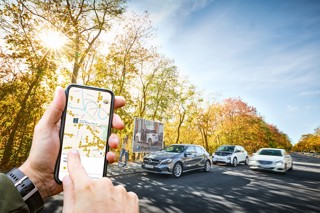Progressive fleet managers are laying the foundations for a future in which their roles will change fundamentally, according to an expert in mobility trends.
Fully autonomous vehicles may still be a few years away, but forward-thinking operators are already seeing the opportunities presented by the other letters in the CASE acronym (Connected, Autonomous, Shared, Electric) to explore how employee and business travel will be transformed in the years to come, said Neckermann Strategic Advisors MD Lukas Neckermann.
His new report, ‘The Mobility Revolution: a primer for fleet managers’, builds on the issues crippling modern cities, primarily air pollution and congestion, to create a compelling business case for a world where the model of one-car-one-driver is superseded by shared, on-demand transport.
“If today the fleet just exists to enable company employees to do their job, the connected vehicle can do so much more.
It reduces insurance costs, it can reduce downtime through predicted maintenance, and it can enable shared use in certain instances,” said Neckermann in a webinar address to the NAFA (National Association of Fellowships Advisors) Foundation.
READ MORE: why are fleet managers morphing into mobility managers?
He forecast that within five years all new cars will be ‘connected’, with the capability to transmit a wealth of data back to fleet operators, and early adopters of telematics tracking systems are showing how this data can revolutionise business practices.
Neckermann cited one company which had used its ability to track its fleet by downsizing its vehicles.
These now carry only half the tools and half the spare parts that they used to transport, thanks to RFID (radio-frequency identification) technology that tracks which tools and parts are on each vehicle; wherever there’s a high density of vehicles, one can source any tools and parts it needs from another.
“If you are thinking about autonomy and about sharing vehicles, the best way to get on board with this is to gather data. Where are the vehicles, what are they doing, how many miles are they driving every day and what kind of environments are they driving in?” said Neckermann.
Armed with this information, he added, fleet managers can identify which vehicles could be shared.
“Fleets will acquire fewer passenger and commercial vehicles. It will become economically feasible to share vehicles supplied by mobility companies rather than acquire cars, vans, pick-ups, buses and commercial trucks that spend most of their time in parking lots,” said Neckermann.
He put the case that many employees will welcome this development, with car ownership losing its lustre in urban areas, where it is no longer “the default mode of transport,” although he conceded that a two-tier transport sector might emerge with rural employees maintaining individual car ownership while city staff switch to shared solutions.
“We believe fleet managers have a key role to play in the vision that mayors and city planners are painting to reduce the congestion, pollution, and traffic fatalities coming from vehicles jammed into city streets – and with it, the rollout and implementation of connected, autonomous, shared and electric vehicles,” said the report.
“Over the next few years, as new options become available, fleet managers will have gone through one entire cycle of consulting their users on new mobility.
"They themselves will have gone on a journey from initially managing grey fleets, perk cars and commercial vehicles, to outsourcing and leasing, ending with car sharing, mixed mode mobility and even overseeing shared autonomous fleets. Almost cliché, the fleet manager will become a mobility manager.”
This editorial feature appears in the December 13, 2018 issue of Fleet News and is sponsored by Goodyear
 At Goodyear, we are focused on what the future holds and how we will be able to respond to it.
At Goodyear, we are focused on what the future holds and how we will be able to respond to it.
To celebrate our 120th anniversary we conducted a
‘Transport of the Future’ survey to find out what members of the
UK public think the future holds for mobility and cities of the future. We asked what they thought the world would look like in 120 years’ time.
According to respondents, cars will still exist, though three quarters believe they will be completely self-driving and half even envision vehicles that will levitate via magnets. A further 88% believe that all cars will have WiFi.
Despite predicted advances in motoring technology, fewer than one in five believe everyone will still use personal cars to commute.
Instead, the survey found that public transport will revolutionise our cities. A quarter of respondents predict that our cities will become pedestrianised, accessible via monorails and 23% envision trains that will operate on different levels, dependent on their speed and whether they are cargo or passenger trains.
Personal transport won’t be the only arena to evolve, 44% of people agreed that same day deliveries will be the norm and more than a quarter anticipated that same hour deliveries will have been rolled out nationwide.
To achieve these delivery times, more than a third believe that door to door deliveries will be made by drones, while a fifth envision self-driving robots operating from a central depot.
The mobility ecosystem is changing at an unprecedented rate and, at Goodyear, we look forward to providing safe, smart and sustainable products and services in the future, whatever that may entail.




















Login to comment
Comments
No comments have been made yet.